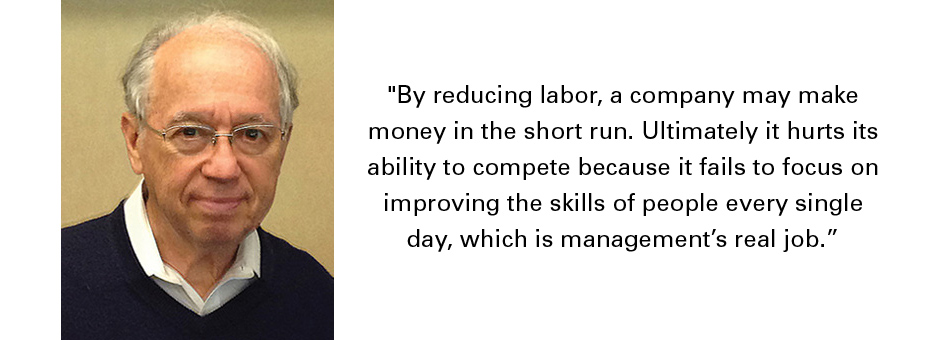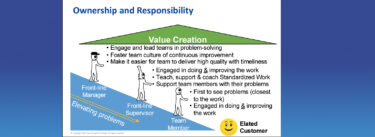In the mid-1980s, I was editor of the newsletter unit at Productivity, Inc., the pioneering purveyor of books and information about the Toyota Production System (TPS) founded by Norman Bodek, when the receptionist forwarded a call from a manager with a question.
“What’s better,” he asked, “just-in-time production or the kanban production system?”
Another time, after talking to an executive caller about the company’s challenges, I asked if he had investigated just-in-time. “We tried that for three months, but it didn’t work,” he said.Much of the early confusion about this new way of producing, managing, and thinking about business was gradually cleared up by the books, articles, training, and conferences produced by Productivity Inc, and Norman.
There were many misconceptions then – and now — about TPS, the prototype business system for what’s known as lean management. Much of the early confusion about this new way of producing, managing, and thinking about business was gradually cleared up by the books, articles, training, and conferences produced by Productivity Inc, and Norman, who died at home in Kirishima, Japan, on December 9, 2020, at 88.
Many of the books were original-source materials by key developers of TPS that Norman had translated into English for the first time. The body of work includes such seminal books as A Study of the Toyota Production System from an Industrial Engineering Viewpoint by Shigeo Shingo; Toyota Production System: Beyond Large-Scale Production byTaiichi Ohno; and the massive, illustrated, six-volume “JIT bible” JIT Implementation Manual: The Complete Guide to Just-in-Time Manufacturing by Hiroyuki Hirano.
Norman ultimately would publish an estimated 100-plus books on lean management, continuous improvement, organizational change, and related topics. English translations on topics such as poka-yoke (error-proofing) total productive maintenance, visual management, and, naturally, productivity and quality improvement, became classics. They built the early intellectual foundation of the lean management movement and advanced its “how-to” implementation knowledge. Many, including the ones cited above, remain important and influential today.
English + Japanese = Janglish
Norman said he got the idea to start Productivity in 1979 after reading an article in the New York Times, reporting that for the first time since World War II productivity in the U.S. had dropped. Concerned about the consequences for America’s competitiveness and American’s prosperity, he went to a local library, expecting to find lots of information and the answer to why productivity had plummeted.
When he found neither, he knew he had a mission – and a business opportunity. What he discovered from his library research was that productivity in Japan was soaring. To learn why, he organized study missions to Japan with groups of executives to observe production methods.
During a 1981 mission to Denso, a key member of the Toyota group of companies, he and Omark Industries President Jack Warne, who died last year, were impressed by the high productivity rates. When they asked company managers for reference materials, their hosts handed them copies of Shingo’s groundbreaking book A Study of the Toyota Production System from an Industrial Engineering Viewpoint, the first book in English, Norman claimed, to accurately explain JIT and kanban, its signature card-based production scheduling system.
On the plane home, they read it, struggling, as did many early lean thinkers, with the dense and ungrammatical “janglish” translation. Shingo had used inexperienced translators to get his original book into English in an effort to correct misconceptions about TPS as Toyota’s success drew more and more international attention.
Despite the clumsy English, “Jack and I read it and realized at once that it was a truly remarkable and powerful book,” wrote Norman in the Foreword to a retranslated and much more readable 1989 version. “By reducing labor, a company may make money in the short run. Ultimately it hurts its ability to compete because it fails to focus on improving the skills of people every single day, which is management’s real job.”
Warne ordered 500 copies immediately for his managers. As a result of applying the methods in the book, Omark soon reaped big benefits: reducing lead time on one product from 12 weeks to four days, cutting plantwide work-in-process by 50 percent, freeing up 30 to 40 percent of floor space in plants, and trimming setup time on a blanking press from eight hours to one minute and four seconds, reported Norman in the 1989 revised edition of Kanban: Just-in-Time At Toyota: Management Begins at the Workplace, another important book on TPS.
The “janglish” book would ultimately sell a reported 30,000 copies. Productivity and the lean management movement were off and running.
Management’s Real Job
Although he had a degree in finance and accounting, Productivity measurement for Norman was not about inputs and outputs. This is from an editorial he wrote for the Productivity newsletter in October 1996:
“But many corporations seem to think that if productivity is measured as outputs divided by inputs, then if we get rid of some of the inputs, we’d be more productive. I think this measure of productivity growth has been detrimental to America. It gives managers an easy way out. Instead of helping people to grow … managers concentrate on reducing the inputs. … To me, productivity is growing. There is a productivity measure, of course. But I think we distort the word when we look primarily at reducing inputs by getting rid of people. By reducing labor, a company may make money in the short run. Ultimately it hurts its ability to compete because it fails to focus on improving the skills of people every single day, which is management’s real job.”
Personal growth became a life-long mission. An admittedly poor student, he once said a teacher told him he was most likely to get ahead – “because he certainly needed one.”
Too bad that teacher wasn’t present when, in recognition for the valuable knowledge he had transmitted to business, he was inducted into the respective halls of fame at the Association for Manufacturing Excellence, IndustryWeek, and the Shingo Academy at Utah State University’s Jon Huntsman School of Business. Fellow inductees at IndustryWeek in 2010 included Lawrence Bossidy, former chairman and CEO of Allied Signal; Michael Dell, founder and CEO of the eponymous tech company, and George Koenigsaecker, an early lean practitioner as a former executive at HON and Danaher.
Ultimately, the erstwhile poor student became an adjunct professor at Portland State University’s School of Business Administration, teaching a course called The Best of Japanese Management Practices. In 2005, he won the Shingo Academy’s Publication Award for his book, Kaikaku, The Power and Magic of Lean.
Miracle Number 9
He had an eccentric side. He meditated and urged others to adopt the practice to find calmness, develop self-awareness, or plumb abilities. He said his own greatest talent was recognizing the talent in others, citing not introspection as the source of the discovery but an aphorism in a fortune cookie.
His 2017 book A Miraculous Life: An Unending Search for Freedom, recounted 60-plus lifetime “miracles,” defined as “extraordinary events driven and given by the Divine.”
Miracle number nine happened during a mundane drive. “A voice came into my head that said, ‘Norman you will never have to worry about money again.’ For some reason I believed it, so I drove to a Jaguar dealer and bought a new car. Miraculously, the voice was right.”
Somehow the “voice” must have known about a workshop launch at Productivity. Shingo’s books sold well, but we weren’t sure if businesspeople would take time away from work to attend a fairly pricey, two-and-a-half-day workshop based on his quick changeover book. When we told Norman the workshop was sold-out plus we had a waiting list with dozens of people, he hit the ceiling. Within minutes, we were locking in additional time with trainers, booking more rooms in the workshop hotel and others nearby, and calling every prospective customer on the waiting list until everyone who wanted to buy a seat in the workshop had one. At a young, growing company miracles don’t make payroll.
He never stopped working. He may have feared that he’d stop growing. His LinkedIn feed lists a virtual workshop that he co-hosted on November 19, 2020. This spring his company, PCS Press, published The Leader’s Guide for Social Responsibility. I don’t know if he got the idea to write the book from another Times story. But I know he’d appreciate that I just gave prospective customers a link to it.






